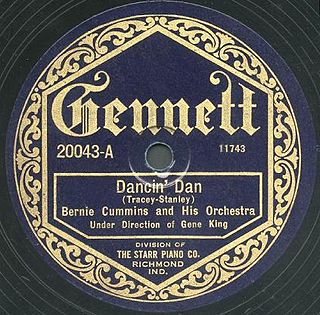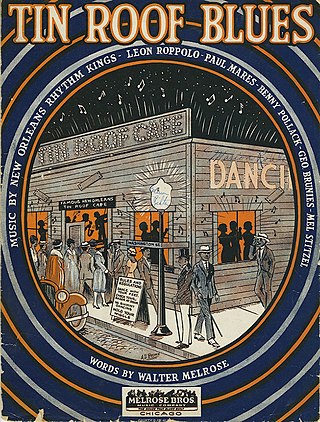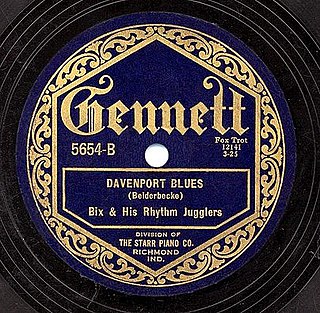
"Farewell Blues" is a 1922 jazz standard written by Paul Mares, Leon Roppolo and Elmer Schoebel.
Contents
It was first released by the seminal jazz band New Orleans Rhythm Kings under the name the Friars Society Orchestra.

"Farewell Blues" is a 1922 jazz standard written by Paul Mares, Leon Roppolo and Elmer Schoebel.
It was first released by the seminal jazz band New Orleans Rhythm Kings under the name the Friars Society Orchestra.
The song was recorded on August 29, 1922, in Richmond, Indiana and released as Gennett 4966A, Matrix #11179, as by the Friars Society Orchestra under the direction of Husk O'Hara. [1] It was first released by the New Orleans Rhythm Kings under the name the Friars Society Orchestra and soon was covered by several jazz bands. [2] A band called The Georgians recorded it in 1923, copying Roppolo's acclaimed clarinet solo note for note. [3]
As well as the many cover versions by jazz performers during the swing era, the tune was also picked up by Hawaiian music artists in this period such as Sam Ku West and Sol Hoopii, and later by instrumentalists in other genres, such as Lester Flatt and Earl Scruggs who recorded a bluegrass arrangement of "Farewell Blues" in 1955.

The Original Dixieland Jass Band (ODJB) was a Dixieland jazz band that made the first jazz recordings in early 1917. Their "Livery Stable Blues" became the first jazz record ever issued. The group composed and recorded many jazz standards, the most famous being "Tiger Rag". In late 1917, the spelling of the band's name was changed to Original Dixieland Jazz Band.
Swing music is a style of jazz that developed in the United States during the late 1920s and early 1930s. It became nationally popular from the mid-1930s. The name derived from its emphasis on the off-beat, or nominally weaker beat. Swing bands usually featured soloists who would improvise on the melody over the arrangement. The danceable swing style of big bands and bandleaders such as Benny Goodman was the dominant form of American popular music from 1935 to 1946, known as the swing era, when people were dancing the Lindy Hop. The verb "to swing" is also used as a term of praise for playing that has a strong groove or drive. Musicians of the swing era include Duke Ellington, Benny Goodman, Count Basie, Cab Calloway, Benny Carter, Jimmy Dorsey, Tommy Dorsey, Woody Herman, Earl Hines, Harry James, Lionel Hampton, Glenn Miller, Artie Shaw, Jimmie Lunceford, and Django Reinhardt.

Gennett Records was an American record company and label in Richmond, Indiana, United States, which flourished in the 1920s and produced the Gennett, Starr, Champion, Superior, and Van Speaking labels. The company also produced some Supertone, Silvertone, and Challenge records under contract. The firm also pressed, under contract, records for record labels such as Autograph, Rainbow, Hitch, Our Song, and Vaughn; Gennett also pressed records for the Ku Klux Klan (KKK). Gennett produced some of the earliest recordings by Louis Armstrong, King Oliver, Bix Beiderbecke, and Hoagy Carmichael. Its roster also included Jelly Roll Morton, Blind Lemon Jefferson, Charley Patton, and Gene Autry.

Barnett, Kyle (2020). Record cultures: the transformation of the U.S. recording industry. Ann Arbor, [Michigan]: University of Michigan Press. p. 42. ISBN 978-0-472-12431-2.
Leon Joseph Roppolo was an American early jazz clarinetist, best known for his playing with the New Orleans Rhythm Kings. He also played saxophone and guitar.
Jazz standards are musical compositions that are an important part of the musical repertoire of jazz musicians, in that they are widely known, performed, and recorded by jazz musicians, and widely known by listeners. There is no definitive list of jazz standards, and the list of songs deemed to be standards changes over time. Songs included in major fake book publications and jazz reference works offer a rough guide to which songs are considered standards.
Mel Stitzel was a German-born pianist best known for his work with the New Orleans Rhythm Kings, a leading jazz band of the early 1920s. The leading members of the group including cornetist Paul Mares, trombonist George Brunies and clarinet player Leon Roppolo were school friends from New Orleans who recruited others such as Stitzel and drummer Gene Krupa to join their band. Stitzel also played with The Bucktown Five in the early 1920s.
Walter Sylvester Page was an American jazz multi-instrumentalist and bandleader, best known for his groundbreaking work as a double bass player with Walter Page's Blue Devils and the Count Basie Orchestra.
"Panama" is a jazz standard. It is by William Henry Tyers, originally entitled "Panama, a Characteristic Novelty", published in 1912.
Edward Durham was an American jazz guitarist, trombonist, composer, and arranger. He was one of the pioneers of the electric guitar in jazz. The orchestras of Bennie Moten, Jimmie Lunceford, Count Basie, and Glenn Miller took great benefit from his composing and arranging skill.

Martin Abraham, better known as Chink Martin was an American jazz tubist.
Elmer Schoebel was an American jazz pianist, composer, and arranger.
Timeless Records is a jazz record label based in the Netherlands.
"Baby Won't You Please Come Home" is a blues song written by Charles Warfield and Clarence Williams in 1919. The song's authorship is disputed; Warfield claims that he was the sole composer of the song.

"Bugle Call Rag", also known as "Bugle Call Blues", is a jazz standard written by Jack Pettis, Billy Meyers and Elmer Schoebel. It was first recorded by the New Orleans Rhythm Kings in 1922 as "Bugle Call Blues", although later renditions as well as the published sheet music and the song's copyright all used the title "Bugle Call Rag".

"Tin Roof Blues" is a jazz composition by the New Orleans Rhythm Kings first recorded in 1923. It was written by band members Paul Mares, Ben Pollack, Mel Stitzel, George Brunies and Leon Roppolo. The tune has become a jazz standard and is one of the most recorded and often played New Orleans jazz compositions.

The period from the end of the First World War until the start of the Depression in 1929 is known as the "Jazz Age". Jazz had become popular music in America, although older generations considered the music immoral and threatening to cultural values. Dances such as the Charleston and the Black Bottom were very popular during the period, and jazz bands typically consisted of seven to twelve musicians. Important orchestras in New York were led by Fletcher Henderson, Paul Whiteman and Duke Ellington. Many New Orleans jazzmen had moved to Chicago during the late 1910s in search of employment; among others, the New Orleans Rhythm Kings, King Oliver's Creole Jazz Band and Jelly Roll Morton recorded in the city. However, Chicago's importance as a center of jazz music started to diminish toward the end of the 1920s in favor of New York.

Davenport Blues is a 1925 jazz composition written and recorded by Bix Beiderbecke and released as a Gennett 78. The song has become a jazz and pop standard.
Lester Rallingston "Shad" Collins was an American jazz trumpet player, composer and arranger, who played in several leading bands between the 1930s and 1950s, including those led by Chick Webb, Benny Carter, Count Basie, Lester Young, Cab Calloway and Sam "The Man" Taylor.